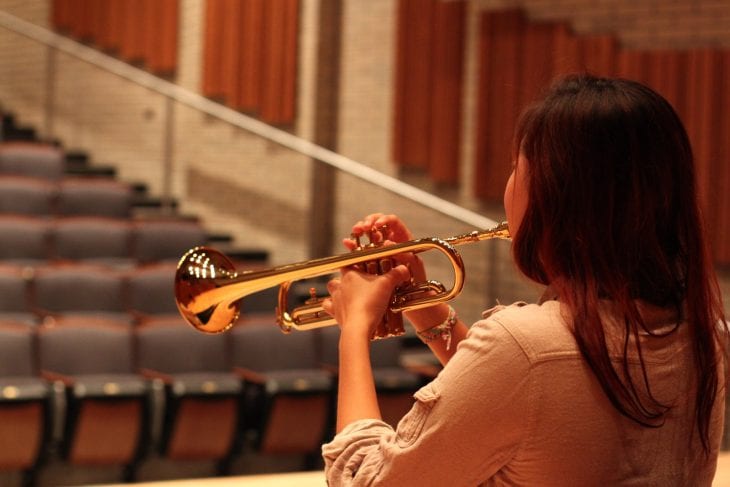There are many instances throughout your music career when you will be required to audition for something. It may be for a job, to get into a program or conservatory, or to be accepted into a specialized school. It could even be just for a short-term or temporary gig, like a house band at a resort, theme park, or on a cruise ship. Whatever the reason, there are certain steps to take that’ll help you look and sound amazing in order to reach your best potential in an audition.

Source: Youtube
Your “Why”
The first question that you should be asking yourself is “Why am I auditioning?” This will aid in establishing the goals that you hope to achieve. Are you looking to gain experience from the audition? Do you want to pass it, and “get in” to something? Are you possibly trying to network, meet new contacts and establish new relationships? Dig deep to find out the reason that you’re going on this audition and focus on that objective.
Music Requirements / Research
It is fairly obvious that you would know the date, time, and expectations set for the audition. Take time to research as much as possible, so you’re ready for what sort of requirements are needed for the music audition. Is there a certain piece you have to play? If you have the freedom to choose the piece to sing or play, make sure you choose a piece that really reflects your style, gives you a good presence and helps you stand out.

Source: National Association of Music Parents
Here are some other questions you should be asking and get answers for:
- Does the piece have to be memorized? How long does the piece need to be?
- For the piece itself: is it in a key that will easily showcase your abilities? Does it need any transposition or re-working ahead of time?
- Is there a specific dress code? Make sure you represent yourself in the best possible manner to reflect your personality without compromising your professionalism.
- Are there certain skills that you need to demonstrate while performing, such as sight-reading or scales? It would be a good idea to practice this beforehand to help sharpen your skills.
- What are you trying to portray? Are you expressing yourself, or are you taking on a character that you wish to play?
- If you’re playing an instrument of some sort, will it be provided for you or do you need to bring (and set up) your own? If singing, will there be an accompanist or will you be playing? Give yourself enough time if you need it!
- Who will you be auditioning for? It doesn’t hurt to find out information about your judges, it might help with knowing how to make an impression.

Source: Backstage
Warm-Ups & Lessons
Warming up your voice and/or instrument is essential to preparedness. Check your instrument well ahead of time if you’re playing, or do some breathing and vocal exercises if singing. If you get the chance to utilize the space for the audition beforehand, you should most definitely take it so you can familiarize yourself with the area and the sound in the space provided.
Physical exercise is also important when warming up because you want to warm up your body in preparation for the audition, not just your voice or an instrument. Singing or playing does require you to utilize your body, which is why it is important to take care of. A lot of auditioners take to yoga because it helps calm your nerves with the focus on breath control, and helps you to feel relaxed. Just doing a simple 10-minute yoga session can make a world of difference in helping you feel less anxiety or stress over your upcoming audition.
Taking lessons prior to your audition is a smart idea and one that comes highly recommended. Consider taking Music To Your Home lessons in NYC if you’re trying out for a New York-based program or group, and let the teacher know that you have an audition coming up. Music teachers are trained professionals that can help you prepare and give you great advice on how to present yourself, what piece to play or sing, or even what to wear to help you feel confident and ready to tackle the audition head-on. They might even be able to help with networking if they have contacts that know or are judging the auditions, so it doesn’t hurt to expand your circle of people by getting to know others in the music business that are in the area. Their networking can give you an edge up on the competition.

Source: ThoughtCo
Organize / Create an Outline
You can never do too much preparation for your audition. If you have the ability to take time and organize your schedule to create yourself an outline for the audition day, then do it. It’s even better if you can plan days leading up to the audition, so you’re assured to give yourself enough time to prepare before the big day and accomplish certain goals you set for yourself.
For instance, if you’re doing a singing audition for a musical, give yourself time to look into the musical and the part you’d like to audition for, so you know the expectations of the role. It’s always a great idea to sing a song directly from the show as well – though take some caution here because sometimes it is noted that the auditioners don’t want that and would rather hear a different song to showcase your talent.
If you’re working with an accompanist, make sure you clearly mark your sheet music, put it in a nice binder in plastic sheeting so it’s easy to read/access. Also, if you have the opportunity to, go over the tempo/style you’d like the piece played in to practice with the accompanist so they are aware and can follow your direction.
Auditioning can be a strange and terrifying experience. But the more prepared you are for your audition, the easier it will be. You won’t be as anxious or nervous having taken the time to cover all your bases and be ready for what to expect. Researching, taking lessons, exercising, and creating a working timeline are all great ways to help you nail that next audition.

Source: Amherst Early Music
